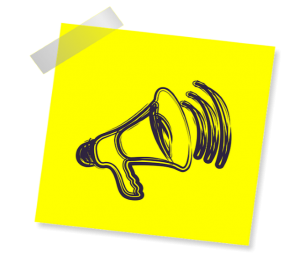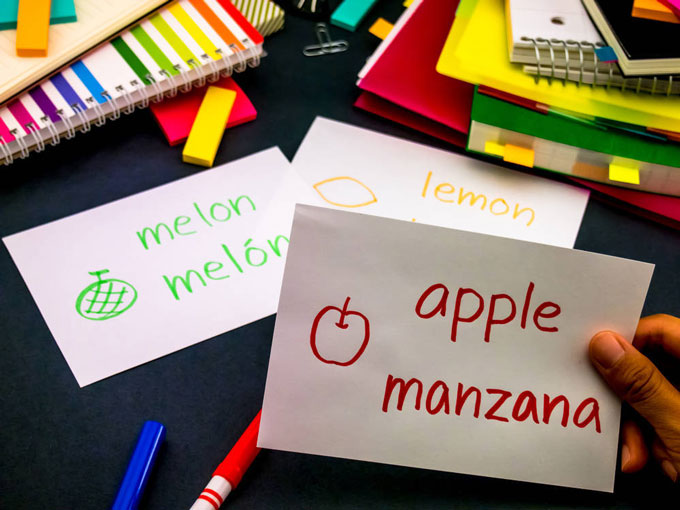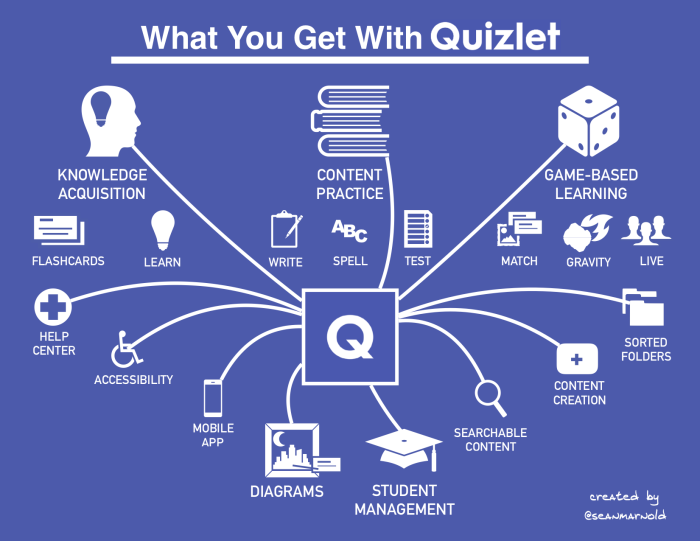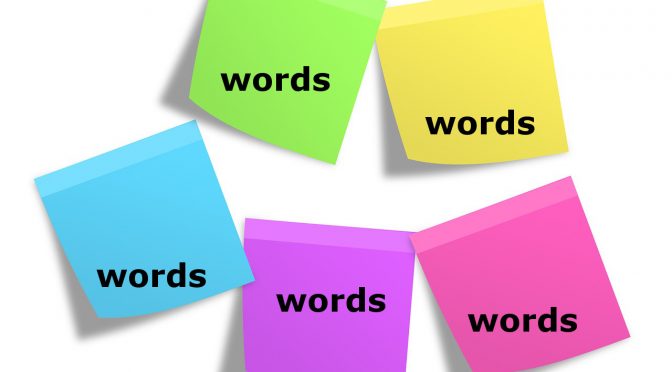Author: Jadranka Bokan
Tips & tools for learning vocabulary
Learning words is very important if you wish to produce (speak and write) in any foreign language. I would dare to say that it’s more important than learning grammar.

This post contains tips and tricks for people who are learning by themselves without the professional help and assistance of a teacher and without the support of the group (in a course). It considers all learning types together and not separately: visual (learns with pictures), auditory (learns through hearing), reading/writing (learns through dealing with words/text), kinesthetic (prefers movement), communicative (likes to talk) and analytical (needs to understand in order to be able to remember).

Some numbers for the start
It is said that native speakers use 2000-3000 words in their everyday life. Knowing that 8 words are recommended to be learned at once or during one learning unit, then you could expect to reach that number in one year by learning just 5-8 words per day. Before you can say that you really know a word, you have to use it 10 times in a sentence. But first you need to remember it – more on it is to come.
Continue reading this post and you will find out where to find online:
– original word pronunciation
– authentic example sentences
– learning partners
– how to create your own flash cards and always keep them with you
-how to organize your words in mind maps
– which tools for learning words you could use while doing anything else on your computer or while using your mobile phone
– word lists for exams at levels A1-B2 (only for German)
-and of course, this post is filled with many useful learning tips
The following web sites and tools will be mentioned:
-record yourself: Audacity
-sentence dictionary: Foboko
–find a speaking partner – websites
–Quizlet app
–Semper app
–free online picture dictionaries
– add-ons for Chrome: Eachword, myVocabu, ReadLang
-create mind maps: GoConqr
– App for learning words at the level A1 (powered by Goethe Institute): Deutschtrainer (only German)
– Wortliste A1 (only German)
– Wortliste A2 (only German)
– Wortliste B1 (only German)
Aaaand finally… Here goes to the tips:
Learn the correct sound of the word.
Make sure that you learn the correct pronunciation of the word that you are learning. Online dictionaries make this possible. All you have to do is to find the new word and then click on the speaker icon in order to hear the correct pronunciation.
When you are trying to remember the sound of the word, make sure to talk with the sound and repeat it 4 times. The more you sound silly the better. Your pronunciation will become perfect with time.
The sound is so important that it is said that you would need to listen the language passively before you start learning it actively. This would mean that you first listen to podcasts, music and news in the foreign language that you plan to start learning and concentrate on its melody. That way a center for that particular language is being created in your brain and only after that your brain is really ready for active learning.
Audacity is the perfect tool for recording your own podcasts. Just read the lesson that you are currently learning out loud and record yourself. That recording you will be able to play later while driving a car, bike or doing anything else. This tool is absolutely free.

Pictures, associations & emotions.
Our brain cannot learn by heart. It can’t remember new things separately, but only if we connect them to the things that we already know and that is why associations are so important. The largest regions in our brain are associative and that is the way how we should learn. The old method with lists of words in notebooks along with translations in our mother tongue is not something that is suitable for our brain. We should associate words with pictures, either just in our head or really on a piece of paper. And if we include emotions, then it’s even better. For example, if you are learning the word “love”, you should think about the person that you love and connect that word with that person.
Look how this works in this video:
Learn in context – “sentence mining”
Always write down (and try to memorize) example sentences for a new word and preferably choose to combine that new word with words that you already know well.
For example, if you should learn the word das Vergnügen (pleasure), try to memorize it within at least one example: das mache ich aus purem Vergnügen or das Buch ist ein tolles Lesevergnügen.
If you don’t like the example sentence that you have in the textbook, please note that free online dictionaries always contain many example sentences. However, they can be sometimes complicated, like in DUDEN. That is why I recommend PONS. PONS also contains an online vocabulary trainer.
If you can’t find as many examples as you wish or if you are not sure that the examples that you have are the most common ones, you could use the Search feature at Twitter. Just type in the needed word and press Search.
You could look for suitable sentences as examples at Foboko too. It is a so called ‘sentence vocabulary’. Just pick the language and type in the word that you need examples for.
This search for example sentences is also known as “sentence mining”.
Attention: don’t try to memorize all possible meanings of the new word that you are learning. Concentrate on finding as many examples as possible for just that one meaning of the word that you are currently learning and preferably find the one example that you like most and that you will be able to remember easily. Otherwise you will end up frustrated and will eventually give up.

Would you like to learn German with me?
Repeat newly learned words regularly.
As soon as we learn something new, we start to forget it. The so cold short term memory lasts for about 20 minutes. That is also when we should repeat the new words for the first time in order to transfer them gradually into the long time memory.
Forgetting is like a “thief” that comes in certain intervals of time. Since we know that, we can prevent forgetting and “be at home”, when it comes to “visit” us.
In other words, we should repeat the words when the odds to forget them are the greatest: 1 day, 7 days and 21 days after learning.
Attention: make sure that you don’t get bored. Don’t repeat words that you have already repeated many times over and over. There are some apps that remind you in intervals, like Memrise, however they cost some money.
There is one old technique, that is pretty time consuming and cumbersome: you could buy or create your own word cards and organize them in 3 piles – the newest ones that should be repeated tomorrow, then the ones that you have already repeated once and that need to be repeated in one week and those that need to be repeated in 3 weeks. For this purpose you could use a “word box” – you don’t have to buy it, you can just use an old shoe box and place your flesh cards in it. I must admit that this method never worked for me. What i prefer these days is given below in the “Keep your words always with you” section.
When we are talking about the time management, I want to emphasize something that generally speaking it’s better to learn a bit every day, than to learn once i a while for a couple of hours.

Pomodoro technique.
This learning technique divides your learning time in intervals. You should learn for 25 minutes and the take a break for 5 minutes. Repeat that cycle 3 more times (4 intervals in total). After that you can take a break for up to 30 minutes. In the meantime make sure that nothing distracts your attention while you are learning. The learning intervals can be shorter or longer – you can determine them yourself. The first fatigue when learning a foreign language appears after 20 minutes. This is also how long the short time memory lasts. Thus, after 20 minutes you should take a break and repeat what you have learned.

Learn ‘relevant’ words.
“Relevant words” are those which you need in a daily conversation. How can you “recognize” them? Here is how: when you are speaking to a person and would like to tell something but you can’t find a word – that is the relevant word. tollpatschig (clumsy), sich emportarbeiten (to work hard and succeed), Quereinsteiger (career changer) were my relevant words which I needed always when I was talking about myself in German. I learned them instantly and never forgot them.
Organize.
Mind maps are an ideal solution for you to keep an order among many words or phrases (Redemittel).
GoConqr enables you to create your own mind maps online which is ideal because you can correct mistakes if you make them or even save and edit your mind maps later. All you have to do is to navigate to the above site and sign up (you can do so via the Facebook button). Once you are in, scroll to the bottom of the page and click on the mind maps icon.

Keep your new words close to you <3.
Write new words on sticky notes and attach them to the things which surround you in your apartment or on walls (near to your bed or in the bathroom). This is a good method when you are learning simple words. The situation gets complicated when you start learning words with abstract meanings.
As we all got used to, you can create flash cards for your new words. You could either buy sets of empty cards and write your new words (with many examples) on them or you could use some online applications or even create your own paper flash cards.

The latter solution is much better because you can install the app in your phone and keep your words always with you. That way you can repeat them while waiting in a traffic jam, at the post office or anywhere else. I would recommend that you use the Quizlet app. It enables you to create your own flash cards or use flash cards from other users (both learners and teachers); you can also use images as ‘translations’ and record your own voice; you can practice your words through several different types of games (flash cards, write, spell, match and test).

If you would like to use existing flash cards online, try out free online picture dictionaries where you will find words that are associated with pictures which is very convenient.
If you prepare your words in an Excel file you can create your own flash cards by using this flash cards tool.
If you prefer flash cards with pictures, then you could create your own photo cards.
In addition, there is a Chrome add-on that is a must. If you are working long on your computer, you could install the Eachword add-on for Chrome. After you add your words to the list (one by one), they will appear out of the blue on your screen in intervals that you determine by yourself which is very convenient.

There are also other useful Chrome add-ons: My Vocabu and ReadLan. They will help you in real time while you are reading new texts on the Internet. Just highlight the word in the text that you are reading and its meaning will show up. Those words will then be stored in a list that you can then work on and learn at a later point. To find out more about these add-ons, where to find them and how they work, click here.
Also, there is another app that can be installed on your mobile phone and make words from your Quizlet list pop-up on your screen every time when you unlock the screen or start other apps (Facebook, Viber etc.). It is called Semper and it is supported by Android. If you are using i-Phone, please check whether it is available in your country.

Use new words actively.
It’s important that you use the words that you learn actively which is why it is so important that you find a learning/speaking partner. With a bit of a luck, you will find a native speaker as a speaking partner.
However, if that doesn’t work, find someone who you can trust and practice with them or just speak to yourself (yes, you can engage in a dialogue with yourself).
Also, try to use new words and not the old ones. Check out how your German can sound more like A2 than A1.
Attention: Don’t be afraid of making mistakes!

Learn and practice for exams – A1 to B2 level – only for German
If you would like to learn and practice your vocabulary from A1 to B2 level, try out this Vokabel Trainer. Memrise can also guide you through different levels of learning German and you can even create your own flash cards (mems) and embed them in the application.
Goethe Institute has provided an app for learning and practising words at the A1 level. Goethe Institute has also provided lists of words for different levels: Wortliste A1, Wortliste A2 ; Wortliste B1
Basic German vocabulary provides you with a solid list of words that you should know at the B2 level. Used examples cost about 25 EUR.





